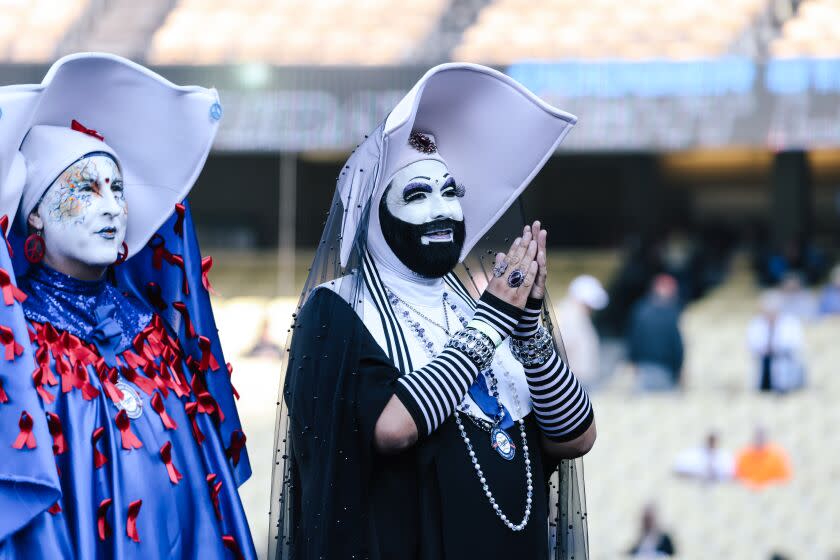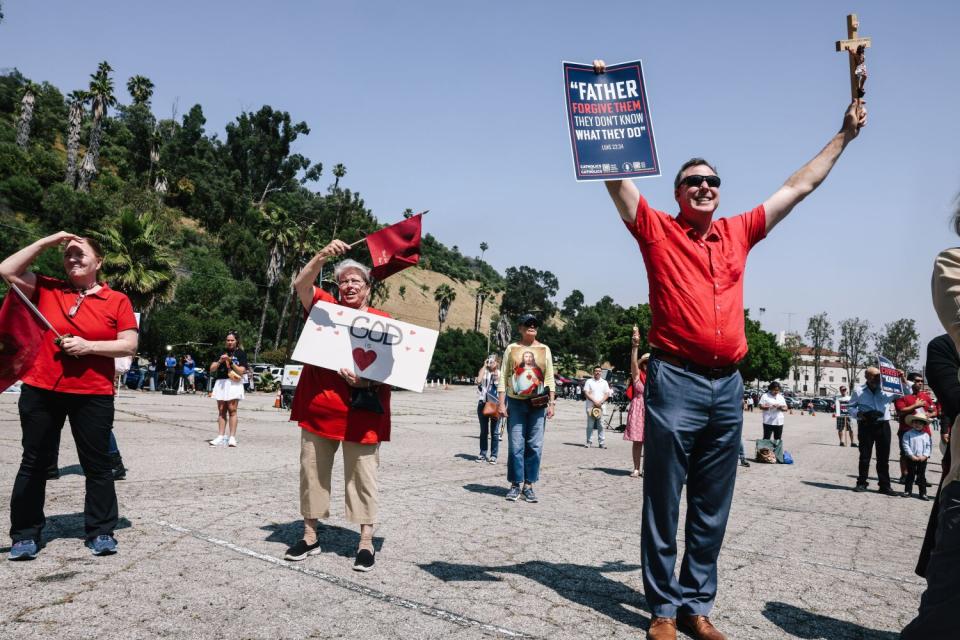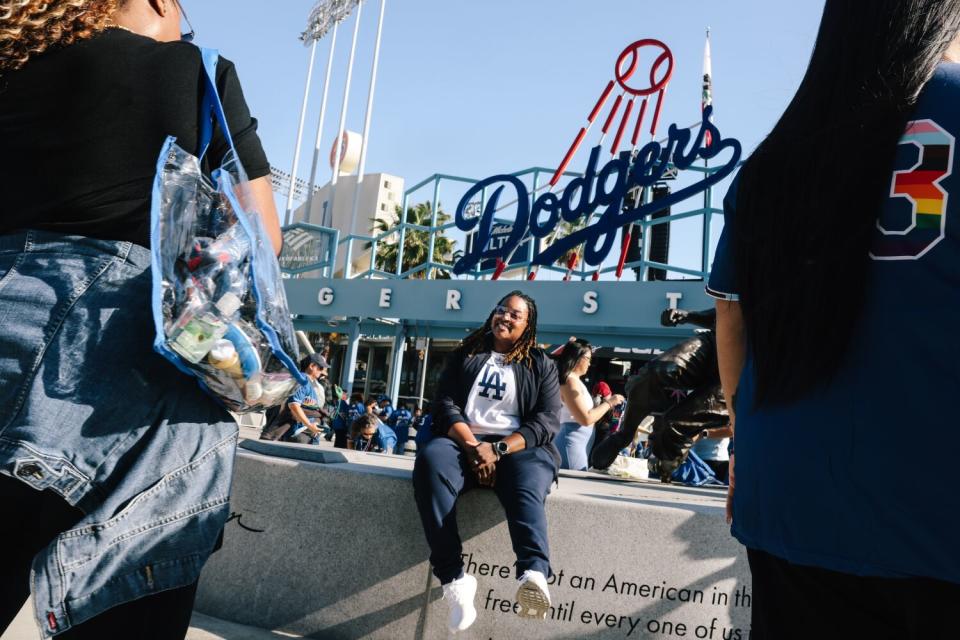Plaschke: Dodgers' Pride Night feels like a rainbow of love

Dodger Stadium has rarely looked more empty.
Dodger Stadium has rarely felt more full.
An hour before the Dodgers hosted the San Francisco Giants on Friday night, in the strangest of sights, there were no players in the dugout, no players on the field, and barely a couple of hundred fans in the stands.
Sister Unity and Sister Dominia didn’t mind.
They stood in front of the third-base line and embraced their Community Hero Award medals as if they were accepting an Oscar.
Read more: Religious groups protest Sisters of Perpetual Indulgence before Dodgers' Pride Night
They waved to a handful of people waving back. They basked in the scattered cheers. They swept dramatically off the field smiling with painted faces and swooshing their blue and black habits.
Outside the gates, several thousand were protesting their existence. Throughout the Catholic community, thousands more showered them with scolding prayers and calls for boycotts.
They didn’t listen. They didn’t run. They didn’t cave. The Dodgers, who caved once, didn’t cave again.
In a four-minute ceremony that was the culmination of three weeks of controversy, the Sisters of Perpetual Indulgence activist organization was finally honored as the highlight of the Dodgers’ 10th annual LGBTQ+ Pride Night.
You could have heard a pin drop. You could have seen hearts soar.
“The stands were more empty than filled, but the mood was warm and happy,” said Sister Unity after a ceremony that was held earlier than most Dodgers pregame events. “People were happy, people were friendly, the sun was shining, the grass was green, and now we have baseball and hot dogs, it’s L.A. at its best.”
The ceremony was held much earlier than the Dodgers normally hold their pregame events because of what the Dodgers claim were safety reasons. There were extra police lining the stands. It didn’t matter. There was no fear. The Sisters weren’t going anywhere.
“There are a couple of thousand people protesting, there are over a million people in my community in L.A. County,” said Sister Unity. “Whatever happens to me, I have to be there for them. This moment was given to us, it was a moral imperative for me to rise to that occasion on behalf of the people who believe in us.”
As you probably know by now, the previously anonymous Sisters are a satirical performance and activist organization that uses humor, drag and religious imagery to call attention to sexuality intolerance.
They are particularly abhorred by Catholics because the Sisters dress like nutty nuns and use skits to desecrate holy rituals and objects.
But their main purpose isn’t to ridicule, it’s to serve. In the 1980s the Sister were at the forefront of the AIDS pandemic, providing comfort and care for countless dying men who many would not touch.
Today their mission has morphed into one of organizing and assisting in charitable events while spreading a message of inclusion, hope, and love.
One moment they might be holding candlelight vigil to support AIDS treatment, the next moment they might be stationed at a Pride festival booth doling out blessings.
As a lifelong Catholic, I am disturbed by some of the grotesque imagery created by the Sisters. But as a proud father of a daughter who is gay, I view this through the eyes of the great MC Plaschke, and can clearly see that the Sisters’ good works far outweigh their controversial performances.
Silly costumes cannot trump authentic caring. Sexuality vaudeville will never trump acts of mercy.
After announcing the Sisters would be honored, the Dodgers shamefully bowed to public pressure and dis-invited them, but five days later changed their minds and did the right thing by bringing them back.
Read more: Recap: Dodgers bullpen meltdown spoils Emmet Sheehan's no-hit debut vs. Giants
Sisters bring too much light into this world to be condemned strictly as agents of darkness. But don’t listen to me. Listen to a Catholic priest.
“Some people are judging from what’s on their website, which is, at times, very disturbing and insulting to anyone who is seriously a religiously vowed person,” said Fr. Chris Ponnet, spiritual director for the Los Angeles archdiocese’s Catholic Ministry With Lesbian and Gay Persons. “On the other side, they have also been historically a group that has worked with the sick and the dying beginning with the HIV and AIDS pandemic.”
Ponnet said that if strident Catholics aren’t careful, the alleged hate they are protesting can actually be coming from them.
“Part of our church position is not to bully, not to demonize, not to hate … and they’ve demonized and bullied,” he said.

Ponnet said there is room to compromise, and he hopes Friday night can be the start of that conversation.
“I hope the present Sisters of Perpetual Indulgence will look at some of the images on their website and hopefully they understand that this hurts people,” said Ponnet. “Equally I hope that the other sides at least honor their pain and frustration at a church that clearly has not been perfect and has been hurtful.”
In all, it was a compelling start to Pride Night, which featured an odd mixture of empowerment and caution.
There were rainbows on the video board and all over the outfield advertisements. Yet the stands along the foul lines were filled with a different color — the yellow coats of extra security guards.
The words of manager Dave Roberts contained messages of unity and peace. But they were occasionally drowned out by several police helicopters.
“My parents raised me to love everyone, to respect everyone, to treat people the way you would want to be treated,” Roberts said, later adding, “Our culture is now in place where, we’re not coexisting, and that’s unfortunate. ... Anyone who wants to come here and support the Dodgers, we’re all in.”

The fans who came for Pride Night also seemed all in, overcoming their initial distaste over the Dodgers dis-invitation to support them for making the right decision.
“I think it’s really important to have these kinds of nights because it does show that baseball isn’t just heteronormative, that the community will come and support a team who supports them,” said Victoria Weinert, 35, a San Diego Padre fan who came for the pride.
“And I think that’s really important that they’re having these nights and that they’re honoring the people who do so much to support and uplift our community.”
Dylan Reinhart, 28, said attending this game was like being home.
“I’m feeling very welcomed,” she said. “I’m glad that they’re doing Nights like these and celebrating people and having an open community for people to just be themselves, who they are.”
There are still miles to go before there is true understanding between this largely conservative sport and the diverse communities that support it.
Earlier this week, quite unbelievably, baseball Commissioner Rob Manfred told reporters that he didn’t support the backbone of Pride Nights, the rainbow logos that appear on team gear.
“We have told teams, in terms of actual uniforms, hats, bases, that we don’t think putting logos on them is a good idea because of the desire to protect players; not putting them in a position of doing something that may make them uncomfortable because of their personal views,” Manfred told reporters, according to the Washington Post’s Chelsea Janes.
The Dodgers and Giants didn’t listen. Rainbows on their heads. Rainbows everywhere. Sister Unity was right. L.A. at its best.
Times staff writer Sarah Valenzuela contributed to this report.
This story originally appeared in Los Angeles Times.

